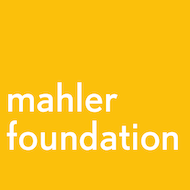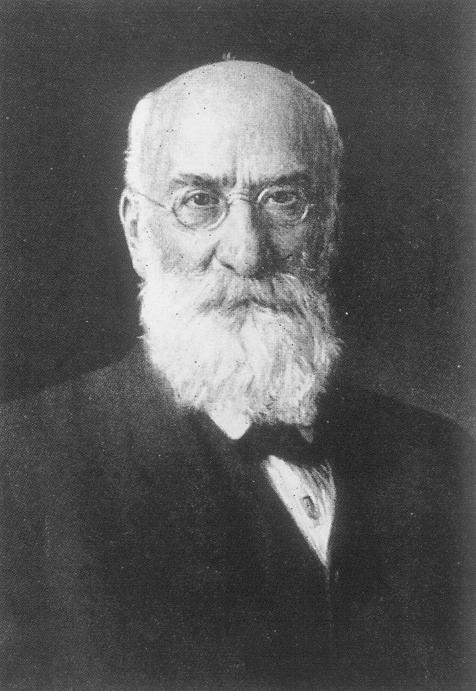- Profession: Writer, musicologist (univ. prof. dr. jur. dr. phil.)
- Residences: Vienna.
- Relation to Mahler: Friend, Akademischer Wagnerverein.
- Correspondence with Mahler: Yes.
- 00-00-0000, Year
- Born: 01-11-1855, Eibenschutz (Ivancice), Moravia.
- Brother of Victor Adler (1852-1918).
- Died: 15-02-1941, Vienna, Austria. Aged 85.
- Buried: 00-00-0000
- Reburied: 27-11-1980 Central cemetery, Vienna, Austria. Grave 32C-51 (Urn).
Early life and education
His father Joachim, a physician, died of typhoid fever in 1857. Joachim contracted the illness from a patient, and therefore told his wife Franciska to “never allow any of the children to become a doctor”.
Adler studied at the University of Vienna and (at the same time (1868-1874)) the Vienna Conservatory of Music (where he studied piano (main subject) and music theory and composition under Anton Bruckner and Otto Dessoff). He received an arts diploma from the conservatory in 1874. In 1878, he graduated from University of Vienna as doctor of jurisprudence, and in 1880 as doctor of philosophy. His dissertation, Die Grundklassen der Christlich-Abendländischen Musik bis 1600 (The Chief Divisions of Western Church Music up to 1600), was reprinted in Allgemeine Musikzeitung.
- Five years older than Gustav Mahler.
- Left School German Gymnasium (Hluboka street Nos. 1/109, Nonnengaschen 608) in Jihlava in Year 1864. Gustav Mahler started there in Year 1869.
- Conservatory of Vienna in period 1868-1874.
- Mahler met him for the first time in Year 1875.
- Founder Akademischer Wagnerverein.
A pioneer of musicology
In 1883 Adler became lecturer in musicology at University of Vienna, on which occasion he wrote Eine Studie zur Geschichte der Harmonie (An Essay on the History of Harmony), published in the “Sitzungsberichte der Philosophisch-Historischen Klasse der Wiener Academie der Wissenschaften”, 1881.
In 1884 he founded (with Friedrich Chrysander and Philipp Spitta) the Vierteljahresschrift für Musikwissenschaft (Musicology Quarterly). Adler provided the first article of the first issue, “Umfang, Methode und Ziel der Musikwissenschaft” (“The Scope, Method, and Aim of Musicology”, 1885), which not only constitutes the first attempt at a comprehensive description of the study of music, but also famously divides the discipline into two subdisciplines, historische Musikwissenschaft (historical musicology) and systematische Musikwissenschaft (“systematic musicology”). In Adler’s article, systematic musicology included Musikologie or vergleichende Musikwissenschaft (comparative musicology), which later became an independent discipline (cf. ethnomusicology). Although these subfields do not exactly line up with current practice, they are roughly maintained in modern European musicology and roughly correspond to the North American the division of musicology into music history (often called “musicology”), music theory, and ethnomusicology.
In 1885 he was called to the newly established German University of Prague, Bohemia, as ordinary professor of the history and theory of music, and in 1898, in the same capacity, to the University of Vienna, where he succeeded Eduard Hanslick. His students at the Musikwissenschaftliches Institut included Anton Webern and composer Karel Navrátil.
In 1886 he published Die Wiederholung und Nachahmung in der Mehrstimmigkeit; in 1888, Ein Satz eines Unbekannten Beethovenischen Klavierkoncerts. In 1892-93 he edited a selection of musical compositions of the Emperors Ferdinand III, Leopold I, and Joseph I (two vols.). Between 1894 and 1938 he was editor of Denkmäler der Tonkunst in Österreich, a seminal publication in music history.
Reputation
Adler was one of the founders of musicology as a discipline (Musikwissenschaft). He was also among the first scholars in music to recognize the relevance of sociocultural factors to music (Musiksoziologie), thereby providing a broader context for aesthetic criticism which, with biography, had been the primary focus of 19th century music scholarship. Empirical study was for him the most important part of the discipline. His own emphasis was on the music of Austria, specifically the music of the First Viennese School: Haydn, Mozart and their contemporaries.
Gustav Mahler
- Both Gustav Mahler (1860-1911) and Guido Adler attended High School in Jihlava but the got to know each other only between 1875 and 1878.
- Year 1905. 01-11-1905. Manuscript Lied Ruckert 4: Ich bin der Welt abhanden gekommen. For solo voice and orchestra. The full score with an autograph presentation inscription on the title-wrapper to his friend, Professor Guido Adler (1855-1941) on the occasion of his fiftieth birthday (“Meinem theuern Freunde Guido Adler (der mir nie abhanden kommen möge) als ein Andenken an seinen 50. Geburtstag Wien 1. November 1905 Gustav Mahler.”)
- In a book by Edward Reilly provides the essential documents connected with the friendship between the eminent Viennese music-historian Guido Adler and the composer Gustav Mahler. The nature and extent of that friendship has been the source of a number of questions for some years. Although Adler was the author of one of the important early studies of Mahler, he was reticent about speaking of his personal connection with the composer, and for many years the single available published letter from Mahler to Adler was one that was sharply critical in tone. A few somewhat disparaging references in Alma Mahler’s recollections also raised questions about the degree of friendship between the two men.

